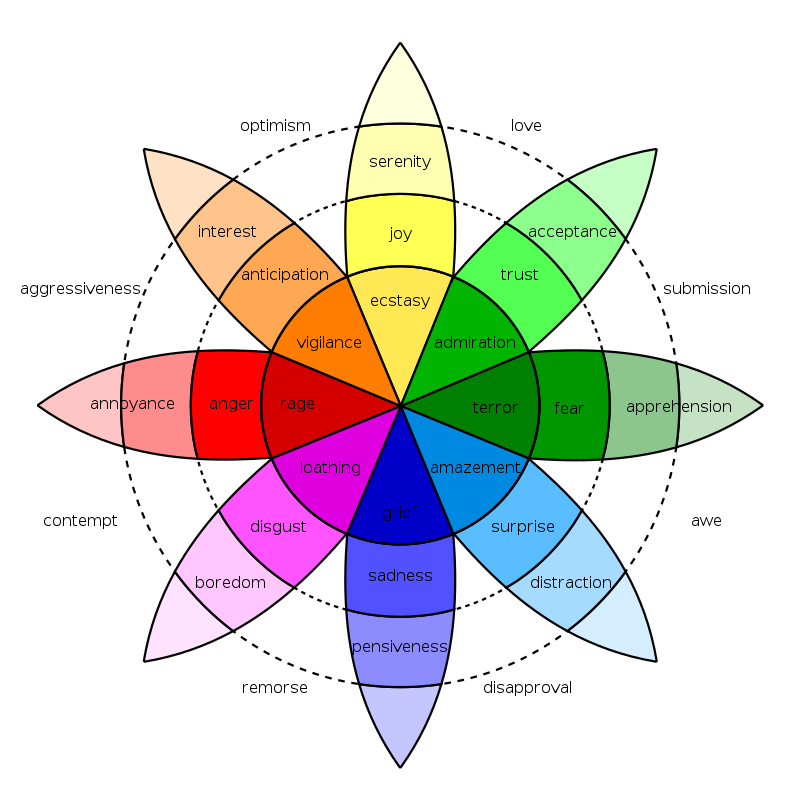Feelings reflect conscious awareness of emotions stirring within. Like the world's most intricate recipe book, the structure and function of these beautiful minds somehow blend and melt, and then remember, a multitude of conscious, subconscious, and neuro-chemical situational responses. In doing so, they weave an emotional tapestry that rivals the stars.

Yet, if the only emotions remaining were those untouched by nicotine, our mind's unfeeling night sky would be empty and dark.
Joy, trust, fear, surprise, sadness, disgust, anger, anticipation, what would each feel like if unaccompanied by addiction to a nervous system stimulant?
As with anger, how many emotions became nicotine replenishment triggers?
Nicotine-free, how calm and mellow would serenity be? What does fear feel like when standing on its own? And what happens when our most feverish anticipation -- that next fix -- ends?
Welcome to what may well be your greatest emotional adventure ever.
Not only will trillions of cells receive fewer toxins and more oxygen, blood-serum nicotine levels will no longer impact emotions, feelings, and mood by direct and indirect stimulation of dopamine, serotonin, norepinephrine, acetylcholine, gamma-aminobutyric acid, and glutamate.[1]
Nicotine dependence contributes to a host of anxiety and mood-related disorders.[2]
Mood scores are lower in users than non-users throughout the day, with delayed and lower peaks, and decreased subjective feelings compared to non-users.[3]
More prone to anxiety, worry, fear, anger, frustration, envy, jealousy, guilt, depressed mood, and loneliness, what's amazing is that more than half of all nicotine addicts have already successfully arrested their dependence.
Why delay joining them a moment longer?
The term "emotional intelligence" refers to the ability of individuals to recognize their own emotions and those of others, to discern between different feelings and label them appropriately, and to use emotional information to guide thinking and behavior (what's known as "emotional repair").[4]
While low emotional intelligence was a likely risk factor in many of us getting hooked while young,[5] high emotional intelligence, most importantly emotional repair or the ability to manage our emotions, is highly protective against relapse.[6]
How confident are you in your ability to recognize and regulate your emotions?
As reviewed in Chapter 4 and a major finding of a 2020 study,[6] the most critical emotional repair lesson of all is that nicotine is not a stressbuster, that addiction to nicotine intensifies stress.
What will stress feel like when anxiety-induced urine acidification is no longer forcing your kidneys to accelerate removal of the alkaloid nicotine from your bloodstream, thus adding the onset of early withdrawal to every stressful situation encountered?
What will relaxation feel like once you reside here on Easy Street with us, more than a billion comfortably recovered ex-users? What will the calm before bed feel like when nicotine is no longer making your heart pound up to 17.5 beats per minute faster?/p>
Imagine entire days, weeks, months, or eventually even years where you're never once punished with wanting, an urge or use crave.
What would it feel like to untangle and free your emotions from your dependency?
Picture getting off of an endless emotional roller-coaster ride of neurochemical lows and highs, a ride yo-yoing you between badly wanting a nicotine "aaah" wanting relief sensation and getting one.
Emotional recovery isn't only about navigating the feelings and emotions brought on by recovery. It's about moving beyond them. It's about freeing them, about brightening every star in life's sky.
Before you is an opportunity to heal pride and self-esteem. Imagine the sea of emotions when you first realize that you actually like, or even love, being free, that you never, ever want to go back. I cried.
Although I've separated recovery's layers for purposes of review and focus, in reality they're so overlapping and intertwined that the best we can hope for is to grasp the obvious. I assure you, it's more than enough.
Such complexity reflects the depth and beauty of who we are, and why it's so sad to continue paying the nicotine addiction industry to pull our emotional strings as if its puppets.
But why has it taken so long for us to awaken to the fact that our emotions became hostage and were being molded by our dependency? And what recovery emotions are totally normal and expected?
As for why it's taken so long, don't be too hard on yourself. The human mind protects and insulates itself from circumstances that seem beyond its control. It does so by employing defensive tactics that work by distorting or blocking reality and natural instincts.
The brain's well-stocked arsenal of defense mechanisms includes denial, displacement, intellectualization, projection, rationalization, reaction formation, regression, repression, sublimation, suppression, compensation, dissociation, fantasy, identification, undoing, and withdrawal.[7]
Dependency recovery understanding and insights can help fuel and inspire freedom's dreams, including helping crumble dependency defenses.
If they were to crumble, what might emotional recovery be like?
The greatest hurdle of all is coming to terms with the death of nicotine-normal. Although normal to miss normal, let's review the natural grief cycle often encountered when ending use.
While doing so, ask yourself, is it possible to enhance our emotional intelligence sufficiently to see beyond a sense of loss, to accelerate return to the normal that existed prior to nicotine-normal becoming normal?
References:
2. Grover KW, et al, Does current versus former smoking play a role in the relationship between anxiety and mood disorders and nicotine dependence, Addictive Behaviors, May 2012, Volume 37(5), Pages 682-685.
3. Adan A, et al, Effects of nicotine dependence on diurnal variations of subjective activation and mood, Addiction. December 2004, Volume 99(12), Pages 1599-1607.
4. Wikipedia, Emotional Intelligence, https://en.wikipedia.org/wiki/Emotional_intelligence 06/10/20
5. Khalil RB et al, The Relationship Between Emotional Intelligence and Nicotine Dependence in Lebanese, Journal of Psychoactive Drugs, Jul-Aug 2017, Volume 49(3), Pages 252-257.
6. Megías-Robles A et al, The protective role of emotional intelligence in smoking relapse during a 12-month follow-up smoking cessation intervention, PLoS One, June 2020, Volme 15(6).
7. Defense mechanism, New World Encylopedia, April 3, 2008, http://newworldencyclopedia.org/entry/Defense_mechanism
All rights reserved
Published in the USA
